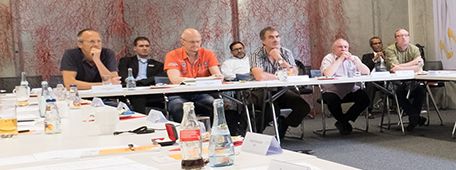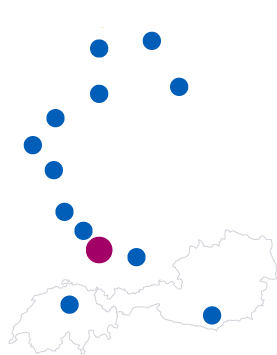Hanseatic city of Stade
Commitment and a structured project plan to create consolidated financial accounts
Challenge
Preparing your first consolidated financial accounts is a complex and time-consuming process. It quickly became clear to project managers in the Hanseatic city of Stade that the project would be impossible without the committed support of the municipal districts to be consolidated, or the group clients. The set time window for completing the initial accounts within one year demanded a high level of planning and organization, as well as a structured approach. That’s why the Lower Saxon city saw establishing a consolidation department to prepare the 2012 consolidated financial accounts and handle all coordination work as a promising path for achieving the goal on time.
Solution
In short: It worked! Having begun work in January of 2014, project managers completed the figures for the consolidated financial accounts at the end of that same year. There were a few key factors in the success of this ambitious plan: the commitment of everyone involved, including the city, participations, and software partners, who all completed the duties agreed and detailed on the project plan within the given time frame. In addition, the diverse functions handled by the Municipal consolidated financial accounts module from Axians Infoma, introduced in the spring of 2014, played a key role in their success.
“Having used the double-entry Infoma newsystem process in our core administration and two optimized municipal enterprises since 2007, we wanted to prepare the annual consolidated financial accounts with a department-based consolidation software, and benefit from fully integrated financial accounting,” says Bianca Lütjen, Department of Finances & Participations and Manager of the Consolidation Department for the city of Stade, explaining the decision.
There was already a guideline for consolidated financial accounts at the start of the project, including process regulations and tips to prepare consolidated financial accounts. These were, however, based on Excel. “The professional and technical support we received from Axians Infoma was a key factor in our success implementing the project. It was important to us to harmonize the professional requirements for municipal consolidated accounting with the technical requirements of the departmental process in a targeted way, and receive services from a single source,” says Bianca Lütjen.
From a technical standpoint, that meant setting up system-based clients and account schedules for evaluations, like the overall balance sheet, comprehensive income statement, and consolidated notes. Help in mapping, internal and external data imports, and recognition of maturities and elimination postings were also part of this work. For example, financial data had to be imported from external databases into the Axians Infoma departmental process for the public regional authorities to be entered into the balance sheet under commercial law (Commercial Code clients). Data was imported using an Excel-based disclosure form, which was processed as a csv. file.
As part of its professional services, the Axians Infoma team worked with the consolidation department to develop an initial project schedule during a kick-off workshop. Process steps related to consolidated accounting were also identified, including creating the asset and earnings classifications and the local item schedule, preparing the financial statements totals, the consolidation methods to be implemented (capital, debt and expense, income consolidation, equity method) and the consolidated financial accounts notes. The disclosure forms, i.e. for data import of the Commercial Code reporting enterprises, the consolidated notes, or to determine internal group business relationships, were also prepared along with Axians Infoma.
As mentioned at the outset, including group clients was another key factor in the success of the project. Bianca Lütjen succeeded in geting all participants on board: “From the consolidation department’s standpoint, it was extremely important for the project process and for complying with the set time frame, that we offer group clients extensive aid and not just present them with a fait accompli. The only way to handle the initial statements was working with the municipal districts to be consolidated.”
That’s why she invited them to an informational and launch event early on to explain key process steps and project milestones. “Even at that time, the group clients felt involved in the process since we were discussing and working on problems and solutions together,” Bianca Lütjen remembers.
Even after the launch event, the consolidation department advised the group clients whenever the situation demanded it, holding meetings with each group client. Above all, however, group clients really only requested the additional work they needed so they wouldn’t overtax their own staff.
Benefits
Bianca Lütjen is highly satisfied with the project process, the support for the public regional authorities to be consolidated, and the collaboration with Axians Infoma as a competent and reliable partner. Her conclusion is positive: “The Hanseatic city of Stade was able to fully comply with our timeline for completing our consolidated financial accounts for 2012 by the end of 2014. This is thanks to methodically structured planning for the project and the individual process steps, as well as consistent implementation by everyone involved, in terms of both content and scheduling. For the first time, we now have a comprehensive overview of the financial and economic position of the entire group.”
Despite this additional information, the consolidated financial accounts are not currently highly relevant for controlling in the strategic and operational core business. “The decision-makers do have informational and controlling-related needs, but the consolidated financial accounts will only be able to meet these if we have more up to date data on the asset, financial, and earnings situation of the overall group,” Bianca Lütjen says. She hopes that the consolidated financial accounts will become more useful for controlling in policy and administration as they are updated.
After her experiences completing the first Stade consolidated financial accounts, she would recommend that local governments looking to tackle this challenging project should use a professional application, instead of just Excel tools, when dealing with a large group of entities to be consolidated. In her opinion, professional consulting from the financial accounting provider is also helpful, “since professional requirements are reviewed to ensure they can be implemented technically in the process.”
In Bianca Lütjen’s view, another key factor for smoothing the process of preparing consolidated financial accounts is to have a clear time frame. Furthermore, the process steps for municipal consolidated accounting must be considered thoroughly in advance and divided into subtasks in a project plan. The consolidation department must be given an appropriate framework for acting and making decisions.
Having begun work in January of 2014, project managers from the Hanseatic city of Stade completed the figures for the consolidated financial accounts at the end of that same year.
Key data
Product Municipal consolidated financial statement
State Lower Saxony
Number of inhabitants
49.230




















